Related Research Articles

Allen Welsh Dulles was the first civilian director of central intelligence (DCI), and its longest-serving director to date. As head of the Central Intelligence Agency (CIA) during the early Cold War, he oversaw the 1953 Iranian coup d'état, the 1954 Guatemalan coup d'état, the Lockheed U-2 aircraft program, the Project MKUltra mind control program and the Bay of Pigs Invasion. He was fired by John F. Kennedy over the latter fiasco.
Milton Bearden is an American author, film consultant and former CIA officer. Bearden served as the president and CEO of the Asia-Africa Projects Group, a Washington, D.C.-based resource development and advisory services firm from 2010 to 2015. He has been an author and film consultant since 1998. As of 2016, Bearden lives in Austin, Texas with his French-born wife, Marie-Catherine, a retired university professor, and now the president and founder of AE & Associates, an inter-cultural business protocol and etiquette consulting group.

Richard Alan Clarke is an American national security expert, novelist, and former government official. He served as the Counterterrorism Czar as the National Coordinator for Security, Infrastructure Protection, and Counter-Terrorism for the United States between 1998 and 2003.
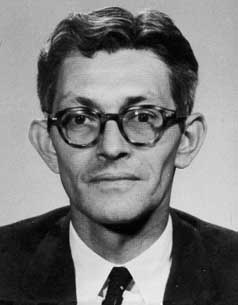
James Jesus Angleton was chief of counterintelligence for the Central Intelligence Agency (CIA) from 1954 to 1975. His official position within the organization was Associate Deputy Director of Operations for Counterintelligence (ADDOCI). Angleton was significantly involved in the US response to the purported KGB defectors Anatoliy Golitsyn and Yuri Nosenko. Angleton later became convinced the CIA harbored a high-ranking mole, and engaged in an intensive search. Whether this was a highly destructive witch hunt or appropriate caution vindicated by later moles remains a subject of intense historical debate.
Anatoliy Mikhaylovich Golitsyn CBE was a Soviet KGB defector and author of two books about the long-term deception strategy of the KGB leadership. He was born in Pyriatyn, USSR. He provided "a wide range of intelligence to the CIA on the operations of most of the 'Lines' (departments) at the Helsinki and other residencies, as well as KGB methods of recruiting and running agents." He became an American citizen by 1984.
Robert Booker Baer is an American author and a former CIA case officer who was primarily assigned to the Middle East. He is Time's intelligence columnist and has contributed to Vanity Fair, The Wall Street Journal, and The Washington Post. Baer speaks eight languages, won the CIA Career Intelligence Medal and is a frequent commentator and author about issues related to international relations, espionage, and U.S. foreign policy. He hosted the History reality television series Hunting Hitler. He is an Intelligence and Security Analyst for CNN. His book See No Evil was adapted by the director Stephen Gaghan and used as the basis for the film Syriana, with George Clooney playing Baer's character.
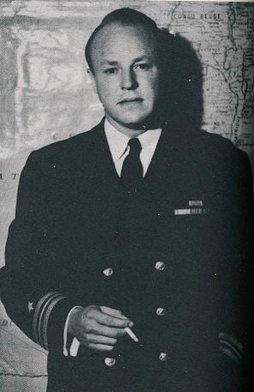
Frank Gardiner Wisner was one of the founding officers of the Central Intelligence Agency (CIA) and played a major role in CIA operations throughout the 1950s.

The Central Intelligence Agency, known informally as theAgency and historically as thecompany, is a civilian foreign intelligence service of the federal government of the United States, officially tasked with gathering, processing, and analyzing national security information from around the world, primarily through the use of human intelligence (HUMINT) and conducting covert action. As a principal member of the United States Intelligence Community (IC), the CIA reports to the Director of National Intelligence and is primarily focused on providing intelligence for the President and Cabinet of the United States. Following the dissolution of the Office of Strategic Services (OSS) at the end of World War II, President Harry S. Truman created the Central Intelligence Group under the direction of a Director of Central Intelligence by presidential directive on January 22, 1946, and this group was transformed into the Central Intelligence Agency by implementation of the National Security Act of 1947.
Athan George Theoharis was an American historian, professor of history at Marquette University in Milwaukee, Wisconsin. As well as his extensive teaching career, he was noteworthy as an expert on the Federal Bureau of Investigation (FBI), J. Edgar Hoover, and U.S. intelligence agencies, having written and edited many books on these and related subjects.
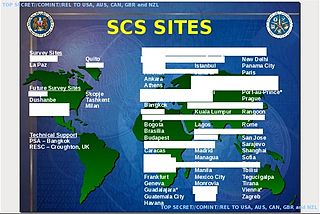
The Special Collection Service (SCS), codenamed F6, is a highly classified joint U.S. Central Intelligence Agency–National Security Agency program charged with inserting eavesdropping equipment in difficult-to-reach places, such as foreign embassies, communications centers, and foreign government installations. Established in the late 1970s and headquartered in Beltsville, Maryland, the SCS has been involved in operations ranging from the Cold War to the Global War on Terrorism.
William King Harvey was an American Central Intelligence Agency (CIA) officer, best known for his role in the terrorism and sabotage campaign known as Operation Mongoose. He was known as "America's James Bond", a tag given to him by Edward Lansdale.
Rhodri Jeffreys-Jones is professor of American history emeritus and an honorary fellow in History at the University of Edinburgh, Scotland. He is an authority on American intelligence history, having written two American intelligence history surveys and studies of the CIA and FBI. He has also written books on women and American foreign policy, America and the Vietnam War, and American labor history.

Tim Weiner is an American reporter and author. He is the author of five books and co-author of a sixth, and winner of the Pulitzer Prize and National Book Award.
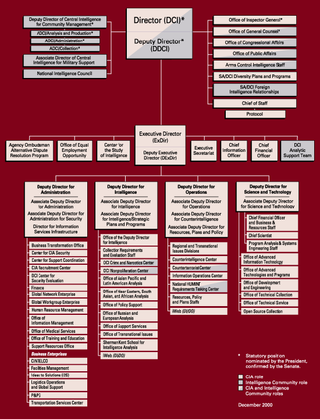
The CIA publishes organizational charts of its agency. Here are a few examples.

Wedge: The Secret War Between the FBI and CIA, a nonfiction book by American historian and policy analyst Mark Riebling, explores the conflict between U.S. domestic law enforcement and foreign intelligence. The book presents FBI–CIA rivalry through the prism of national traumas—including the Kennedy assassination, Watergate, and 9/11—and argues that the agencies' failure to cooperate has seriously endangered U.S. national security.
The Center for Policing Terrorism (CPT) is a national-security think tank formed after 9/11 in New York City.
Carmel Offie was a U.S. State Department and later a Central Intelligence Agency (CIA) official. He was dismissed from the CIA in 1950 after an arrest a few years earlier brought his homosexuality to the attention of Senator Joseph McCarthy during the Lavender scare that saw a purge of the State Department personnel because of charges of homosexuality.

Paula Dean Broadwell is an American writer, academic and former military officer. Broadwell served in the US Army on both active and reserve duty for over 20 years, including time as a military school undergraduate with experience in over 70 countries. In 2012, she co-authored, with Vernon Loeb, All In: The Education of General David Petraeus, a biography of then-International Security Assistance Force commander David Petraeus. She is the co-founder and co-director of the Think Broader Foundation, a media consulting firm that focuses on addressing gender bias in the media and society. Broadwell is most notable for her involvement in the Petraeus scandal.
William Osmund Cregar was an American football guard who played for the Pittsburgh Steelers. He played college football at the College of the Holy Cross, having previously attended Frank H. Morrell High School. He is a member of the College of the Holy Cross Athletic Hall of Fame.
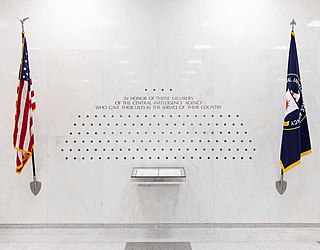
The United States Central Intelligence Agency (CIA) dates from September 18, 1947, when President Harry S. Truman signed the National Security Act of 1947 into law. A major impetus that has been cited over the years for the creation of the CIA was the unforeseen attack on Pearl Harbor, but whatever Pearl Harbor's role, at the close of World War II government circles identified a need for a group to coordinate government intelligence efforts, and the Federal Bureau of Investigation (FBI), the State Department, the War Department, and even the Post Office were all jockeying for that new power.
References
- 1 2 Michael R. Beschloss, "Such Bad Friends" The New York Times Book Review, November 6, 1994.
- ↑ Los Angeles Police Department News Release, March 7, 2008.
- ↑ Christopher Dickey, Securing the City (Simon and Schuster, 2009), 30ff
- ↑ Michael A. Sheehan, ISBN 978-0-307-38217-7.
- ↑ Andrew C. McCarthy, "The Intelligence Mess", The Wall Street Journal, September 20, 2006. Archived October 22, 2006, at the Wayback Machine
- ↑ Vernon Loeb, "From the 'Hanssen Effect' to Sept. 11", The Washington Post, October 21, 2002.
- ↑ "Church of Spies: The Pope's Secret War Against Hitler | IndieBound.org". www.indiebound.org. Retrieved 2022-05-19.
- ↑ Harris, Sam, "Rethinking 'Hitler's Pope'", September 28, 2015